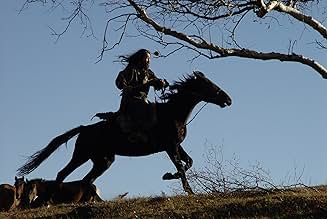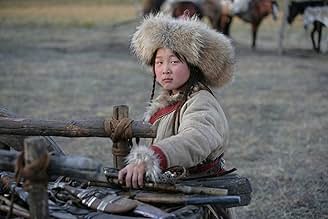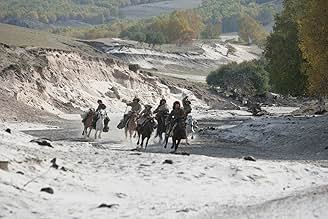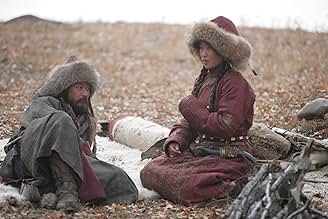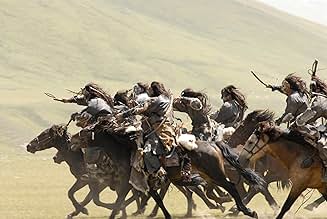AVALIAÇÃO DA IMDb
7,2/10
50 mil
SUA AVALIAÇÃO
A história narra o início da vida de Genghis Khan, que era um escravo antes de conquistar metade do mundo em 1206.A história narra o início da vida de Genghis Khan, que era um escravo antes de conquistar metade do mundo em 1206.A história narra o início da vida de Genghis Khan, que era um escravo antes de conquistar metade do mundo em 1206.
- Indicado a 1 Oscar
- 16 vitórias e 13 indicações no total
Baasanjav Mijid
- Esugei - Temudjin's Father
- (as Ba Sen)
Ayuur
- Sorgan-Shira
- (as A You Er)
Huntun Batu
- Altan
- (as Hong Jong Ba Tu)
Deng Ba Te Er
- Daritai
- (as E Er Deng Ba Te Er)
Su Ya La Su Rong
- Girkhai
- (as Su You Le Si Ren)
- Direção
- Roteiristas
- Elenco e equipe completos
- Produção, bilheteria e muito mais no IMDbPro
Enredo
Você sabia?
- CuriosidadesDirector Sergei Bodrov and Production Designer Dashi Namdakov visited Mongolia's chief shaman in the capital city of Ulan Bator, so that they could ask permission to film a movie about Genghis Khan's life. The shaman told them that of all the people who have talked about making such a film, they were the only ones to ask his permission.
- Erros de gravaçãoThe Mongolian tribes, including the hordes that conquered their vast empire, rode on a very peculiar race of horses, stocky build, with relatively short legs and a large head. The horses used in the movie look like ordinary western horses
- ConexõesFeatured in The 80th Annual Academy Awards (2008)
- Trilhas sonorasBeginning
Composed By Tuomas Kantelinen
Performed by Hamburg Film Orchestra, The London Session Orchestra, One Orchestra, Altan Urag
© 2008 X-Filme Creative Pool GmbH.
(p) 2008 Kinofabrika GmbH & Tuomas Kantelinen Ensemble.
Avaliação em destaque
Astonishingly, the name and the person of Genghis Khan in Sergei Bodrov's "Mongol," a great, Shakespearean drama about this seminal figure in history, don't appear until the very end of the two-hour epic. Instead, we see Temudjin, the man yet to become (posthumously) Khagan (emperor) of what was to be for several centuries the largest contiguous empire in history. Whether Bodrov completes the contemplated two additional chapters of the story or not, "Mongol" stands on its own as a masterpiece.
Contradicting the Western (and Russian) image of Genghis as the monstrous conqueror, Bodrov's work is influenced by Lev Gumilev's "The Legend of the Black Arrow" and is based on "The Secret History of the Mongols," the 13th century Mongolian account, unknown until its re-emergence in China 700 years later. For a director, who learned in school only about the horrors of Russia's 200-year subjugation by the Mongols, taking a "larger view" is a remarkable act.
Unlike Omar Sharif in the 1965 Henry Levin "Genghis Khan" or Takashi Sorimachi in Shinichiro Sawai's disappointing 2007 "To the Ends of the Earth and Sea," Tadanobu Asano in Bodrov's film is strictly Temudjin, not the great Khan. He lived from 1162 to 1227, and "Mongol" covers the years between 1171 and the beginning of the unification of Mongolian tribes around the turn of the century.
In fact, the spookily powerful child Temudjin (Odnyam Odsuren) dominates the first part of the film, undergoing trials and tribulations that make the lives of Dickens' abused and imperiled children look like a picnic. From age nine into his 30s, Temudjin was orphaned, hunted, imprisoned, enslaved, and constantly threatened by extinction. Literally alone in the vast landscape (brilliantly photographed by Rogier Stoffers and Sergei Trofimov), Temudjin escapes death repeatedly, at times almost mysteriously.
"Mongol" is huge - with endless vistas and epic crowd scenes, quite without special effects - but Bodrov keeps the setting just that, never strutting visuals for their own sake. The film is about people, and the cast is magnificent. Asano's face and eyes hold attention, and make the viewer experience simultaneous feelings of getting to know the character he plays and being held at arm's length. Bodrov and Asano escape all the many Hollywood pitfalls in making an epic - they present nothing easy, predictable, trite. The term "Shakespearean" is used here advisedly.
The Mongolian actors are sensational: Khulan Chuluun is luminous as Borte, Temudjin's wife; Borte's 10-year-old self, the girl who chooses Temudjin, then 9, while he thinks he is the one making the decision, is unforgettable, even if the name is hard to remember: Bayertsetseg Erdenebat.
Chinese actors are vital to the film. As Temudjin's father (poisoned by Tatars before the boy reached 10), Sai Xing Ga makes an impression few actors can achieve in such a brief appearance. Nearly overshadowing Asano is the grand thespian exercise from Sun Hong-Lei, as Temudjin's all-important blood brother Jamukha. Sun is almost too big for the big screen, perhaps a less intense performance would have served the film better.
Another problem is near the end of "Mongol," with Borte's stranger-than-fiction (and actually fictional) rescue of Temudjin from a Tangut prison, years, hundreds of miles, and impossible alliances and dalliances telescoped into a few near-incongruous minutes - all to cover a 10-year-long gap in Genghis' history. Except for that, however, Bodrov's work is engrossing, spectacular, and memorable.
Contradicting the Western (and Russian) image of Genghis as the monstrous conqueror, Bodrov's work is influenced by Lev Gumilev's "The Legend of the Black Arrow" and is based on "The Secret History of the Mongols," the 13th century Mongolian account, unknown until its re-emergence in China 700 years later. For a director, who learned in school only about the horrors of Russia's 200-year subjugation by the Mongols, taking a "larger view" is a remarkable act.
Unlike Omar Sharif in the 1965 Henry Levin "Genghis Khan" or Takashi Sorimachi in Shinichiro Sawai's disappointing 2007 "To the Ends of the Earth and Sea," Tadanobu Asano in Bodrov's film is strictly Temudjin, not the great Khan. He lived from 1162 to 1227, and "Mongol" covers the years between 1171 and the beginning of the unification of Mongolian tribes around the turn of the century.
In fact, the spookily powerful child Temudjin (Odnyam Odsuren) dominates the first part of the film, undergoing trials and tribulations that make the lives of Dickens' abused and imperiled children look like a picnic. From age nine into his 30s, Temudjin was orphaned, hunted, imprisoned, enslaved, and constantly threatened by extinction. Literally alone in the vast landscape (brilliantly photographed by Rogier Stoffers and Sergei Trofimov), Temudjin escapes death repeatedly, at times almost mysteriously.
"Mongol" is huge - with endless vistas and epic crowd scenes, quite without special effects - but Bodrov keeps the setting just that, never strutting visuals for their own sake. The film is about people, and the cast is magnificent. Asano's face and eyes hold attention, and make the viewer experience simultaneous feelings of getting to know the character he plays and being held at arm's length. Bodrov and Asano escape all the many Hollywood pitfalls in making an epic - they present nothing easy, predictable, trite. The term "Shakespearean" is used here advisedly.
The Mongolian actors are sensational: Khulan Chuluun is luminous as Borte, Temudjin's wife; Borte's 10-year-old self, the girl who chooses Temudjin, then 9, while he thinks he is the one making the decision, is unforgettable, even if the name is hard to remember: Bayertsetseg Erdenebat.
Chinese actors are vital to the film. As Temudjin's father (poisoned by Tatars before the boy reached 10), Sai Xing Ga makes an impression few actors can achieve in such a brief appearance. Nearly overshadowing Asano is the grand thespian exercise from Sun Hong-Lei, as Temudjin's all-important blood brother Jamukha. Sun is almost too big for the big screen, perhaps a less intense performance would have served the film better.
Another problem is near the end of "Mongol," with Borte's stranger-than-fiction (and actually fictional) rescue of Temudjin from a Tangut prison, years, hundreds of miles, and impossible alliances and dalliances telescoped into a few near-incongruous minutes - all to cover a 10-year-long gap in Genghis' history. Except for that, however, Bodrov's work is engrossing, spectacular, and memorable.
- janos451
- 22 de mai. de 2008
- Link permanente
Principais escolhas
Faça login para avaliar e ver a lista de recomendações personalizadas
Detalhes
- Data de lançamento
- Países de origem
- Idiomas
- Também conhecido como
- Mongol: The Rise of Genghis Khan
- Locações de filme
- Inner Mongolia, China(location)
- Empresas de produção
- Consulte mais créditos da empresa na IMDbPro
Bilheteria
- Orçamento
- US$ 18.000.000 (estimativa)
- Faturamento bruto nos EUA e Canadá
- US$ 5.705.761
- Fim de semana de estreia nos EUA e Canadá
- US$ 135.326
- 8 de jun. de 2008
- Faturamento bruto mundial
- US$ 26.527.510
- Tempo de duração2 horas 6 minutos
- Cor
- Mixagem de som
- Proporção
- 2.35 : 1
Contribua para esta página
Sugerir uma alteração ou adicionar conteúdo ausente

Principal brecha
What was the official certification given to O Guerreiro Genghis Khan (2007) in Brazil?
Responda






